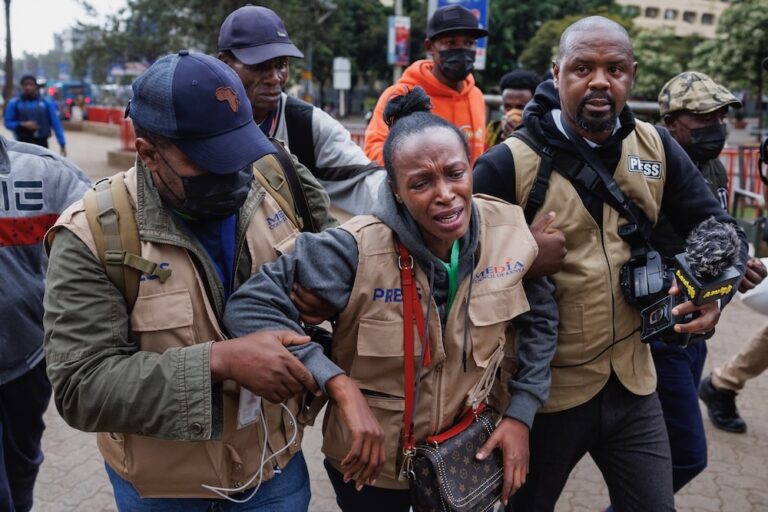(NDIMA/IFEX) – According to NDIMA, an attempt by police detectives to have the chief editor and a director of “The Star” newspaper give statements at the Kasarani Police Station failed when the publication’s lawyers explained that the police affidavit was not in order. The lawyers also argued that an affidavit had already been filed in […]
(NDIMA/IFEX) – According to NDIMA, an attempt by police detectives to have
the chief editor and a director of “The Star” newspaper give statements at
the Kasarani Police Station failed when the publication’s lawyers explained
that the police affidavit was not in order. The lawyers also argued that an
affidavit had already been filed in court seeking to restrain the police
commissioner from searching the publication’s offices.
**Updates IFEX alert of 6 April 1998**
The detectives visited the newspaper’s offices in Cannon House, Nairobi,
looking for editor Magayu Magayu and Mathenge Wanderi, a director. The
detectives were also reportedly looking for Mr. Maina Kabure, the press
managing director. The two Kasarani criminal investigations officers, Supt.
Z. Mbundi, and Insp. Henry Kiambati, said they were investigating the
newspaper’s recent story about a government- planned coup.
“The Star”‘s 27-30 March 1998 issue contained the headline “How coup was to
be executed.” The article stated that a purported coup was to be
stage-managed on 24 March 1998 by top government officials, which would then
be blamed on key opposition leaders. It was to lead to a bloodbath,
particularly in Nairobi, and was to be executed by the military, the air
force and crack police force units.
Mr. Magayu called lawyers Janet Mulwa and Prof Kivutha Kibwana before the
detectives interrogated him in his office.
The lawyers told the detectives that the affidavit did not disclose the
alleged offense and that it had to be rectified to have the force of law.
“We have told them to refer the warrant back to the magistrate to disclose
the alleged offense,” said Prof. Kibwana.
In the suit, filed on 6 April 1998, the publishers and printers also want
the police boss and his officers prohibited from arresting directors,
editors, journalists or other workers of “The Star” Publishers Limited and
Ruaraka Printing Press Limited.
Background Information
On the night of 31 March 1998, staffers of “The Star” were holed up in
their offices after thwarting a bid by police to raid their offices. They
said six plainclothes police officers went to their offices at 5:30 p.m. and
informed the guards that they wanted to conduct a search. Since they did
not have a search warrant and failed to provide a reason for the search, the
employees refused them access to the offices by locking the burglar-proof
door. The police were also seeking to have the plate of the issue that
carried the story on the coup, but they were informed plates are normally
thrown away.
On 14 April 1998, the Nairobi Chief Magistrate’s court granted detectives
from the Criminal Investigations Department permission to search the offices
and printing presses of “The Star” and “The Dispatch” magazines.
The affidavits seeking the search warrants were sworn by Inspector Kiambati,
attached to the CID at Kasarani Police Station. In the application, the
police claimed the offices of the two magazines were being used to deposit
alarming publications, contrary to section 66 of the Penal Code.


